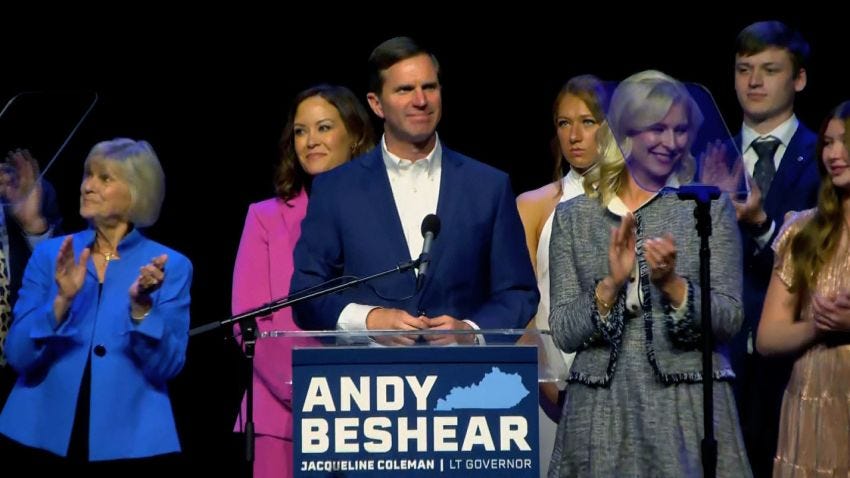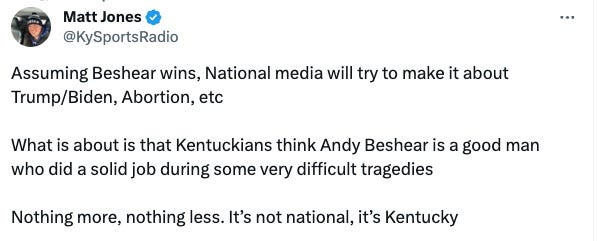The 2023 election is over. And it was a VERY good one for Democrats — as they scored across-the-board victories in places like Virginia and Kentucky.
I sifted through the results and came away with a few thoughts about a) what we witnessed and b) what it all means. They’re below.
Abortion, abortion, abortion. If you are looking for one BIG takeaway from the 2023 election, it’s this: Abortion is a politically toxic issue for Republicans — and they don’t seem to get that just yet.
Consider:
Kentucky Gov. Andy Beshear, a Democrat, won reelection in a solidly conservative state at least partly because of this abortion-focused ad.
Democrats kept control of the Virginia state Senate and won control of the Virginia state House in an election that Republican Gov. Glenn Youngkin cast, at least in part, on his proposed 15-week abortion ban.
Issue 1, which would codify the right to an abortion into the Ohio constitution, passed with a clear majority despite the state’s increasingly Republican tilt.
Republican political consultant Dan Bayens put it best:
He’s exactly right. Ohio on Tuesday became the 7th state to write abortion protections into its state Constitution since the Supreme Court overturned Roe v Wade in 2022. As the Washington Post’s Phillip Bump noted, 4 of those 7 states — including Ohio — are places where Joe Biden lost in 2020.
The simple fact is this: There is a clear majority of voters in this country who believe that abortions should be safe and legal. The issue is not only a MAJOR motivator for the Democratic base but also cuts across political affiliations — especially among women.
What’s remarkable to me is that Republicans — at least some of them — don’t seem to get the message that voters keep sending. “This isn't the end,” said the Ohio Republican state Senate leader after the defeat on Tuesday. “It is really just the beginning of a revolving door of ballot campaigns to repeal or replace Issue 1.”
Dude….
Democrats breathe a sigh of relief. They won’t admit it today — it’s all high fives and I-told-you-so’s on Twitter — but Democrats were petrified going into Tuesday’s election.
The dominant national narrative — as it’s been for the last few weeks (at least) — was that Joe Biden was in deep trouble heading into 2024. Even as results were coming in on Tuesday, CNN released a new national poll that showed Biden trailing Donald Trump by four points.
Had Democrats lost control of the Virginia state Senate — handing Youngkin and Republicans control over all levers of state government — or had Beshear come up short against highly-touted Republican candidate Daniel Cameron, that narrative would have gone into overdrive. Like, full-on panic.
To be honest, I am a little skeptical that the results on Tuesday are — as Democrats are arguing today — proof positive that Biden is in better shape than everyone thinks.
This, from media personality (and Kentuckian) Matt Jones, hits that point:
BUT, had Beshear lost, there’s no question that it would have been added to a growing list of data points suggesting that Democrats and Biden were faltering as the calendar turned to 2024.
They avoided that narrative, which is a big deal.
Youngkin’s national hopes take a hit. It was always a pipe dream — as I wrote — that Youngkin would somehow a) enter the GOP presidential race and b) seriously challenge Trump for the nomination.
Even if Tuesday had gone Youngkin’s way, it was way too late (and Trump is way too far ahead) for him to have mattered in the presidential primary.
But, Tuesday did not go Youngkin’s way. Not even close. And make no mistake: This is a major tarnishing of his brand in both Virginia and nationally.
“What an epic failure by Governor Youngkin,” said “Fox and Friends” co-host Brian Kilmeade on Wednesday morning. “It’s a huge loss for him.”
Youngkin only has himself to blame here. He went all out — campaigning and spending heavily — in an attempt to keep the state House and flip the state Senate to Republicans. And he made clear that if voters handed his party that “trifecta,” it would allow him to move legislation that would ban abortion after 15 weeks.
Swing and a miss!
This defeat won’t entirely knock Youngkin off the national stage. My guess is he will still be in the mix for 2028. But, he now has the stink of defeat on him. And no one likes that smell.
Beshear’s future looks bright. Andy Beshear just got elected to a second term as a Democrat in a state that Trump won with 62% in 2020 (and will win overwhelmingly in 2024 too).
That’s something that national Democrats have to pay attention to as they seek to broaden their coalition nationally.
“Beshear is not yet 46. And he's about to put up a real margin for a deep red state,” tweeted Politico’s Jonathan Martin on Tuesday night. “The 2028 prez or vp buzz shall begin.”
The question, of course, is whether Beshear’s appeal in Kentucky could be ported into a national campaign (and whether he is too conservative to be a major player in a Democratic presidential primary).
As the Louisville Courier-Journal noted of the race:
Beshear had branded himself in ads and debates as a moderate whose appeal could cross over to Trump voters, and as someone who had at times opposed both presidents during his years on office, which spanned both presidential administrations.
"My job as governor is to stand up for Kentuckians, whether that is for or against any president," he said during an October debate. "There were times I agreed and disagreed with President Trump. There are times I agree and disagree with President Biden."
That will play less well nationally among Democrats than it played among Kentucky Democrats.
Still! Beshear is yet another Democratic governor — joining the likes of Gretchen Whitmer of Michigan, Josh Shapiro in Pennsylvania and Wes Moore in Maryland — that will likely be in the national mix for years to come, proof positive that Democrats have a very strong bench waiting for 2028 and beyond.
Turnout was meh. Not to rain too much on the Democrats’ celebration parade — it was a good night for them! — but voter turnout on Tuesday was less than stellar.
Here’s the Cook Political Report’s David Wasserman on that fact:
Tuesday’s raw numbers underscore the perils of extrapolating off-off-year election results and narratives to draw inferences about the next presidential election. If there was a common thread across Kentucky, Mississippi, and Virginia, it was that turnout was down from the comparable cycle four years ago in 2019. This mirrors the downturn in turnout between 2018 and 2022, suggesting that political engagement and participation — while still robust— isn’t quite as red-hot as it was in the Trump era….
…Democrats’ Tuesday successes — which mirror their recent streak of strong special election showings — lend support to the theory that they are excelling with the types of civic-minded, highly-engaged voters who show up in off-year races. However, turnout next year is likely to be a whopping 60% to 90% higher than it was on Tuesday. The danger for Democrats: This “add-on electorate” skews anti-establishment and is less likely to be motivated by the abortion issue than those who showed up in Ohio and Virginia in 2023.
Again, this isn’t to say that you’d rather be Democrats today than Republicans. What it is to say is that the voting dynamics of an off year election in a handful of states may not be entirely predictive of what the electorate will look like when November 2024 comes around.







Big losses for the MAGA school board types ... sorry, not sorry
Never been particularly interested or motivated by polls, but I think it's time to start looking at just WHO these polls are talking to. Assuming most polling is still conducted by phone, can we talk about who's actually answering those calls? The majority of American households no longer have landlines, and according to the Pew Research Center, 80% of us don't answer cell phone calls from numbers we don't recognize. Wouldn't it be fair to say that the 20% who do may not necessarily be representative of the nation as a whole?